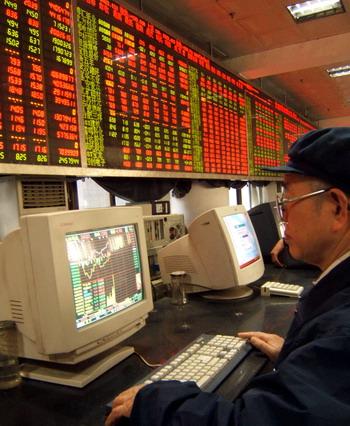
An investor watches market performance on a computer terminal at a securities trading office in Beijing. The June contract, the most actively traded, gained 1.44 percent last Friday to close at 2,801 points. The rise in index futures indicates improved market sentiment over the long run as investors' concerns of further policy tightening ease. [Ren Weihong / For China Daily]
Analysts say investors' fears of more credit-tightening are starting to easeBeijing - The gains in China's stock index futures may signal that long-term market sentiment may start to improve as investors' concerns about the possibility of more credit tightening eased, analysts said.
The June contract, the most actively traded, gained 1.44 percent last Friday to close at 2,801 points. The May contract was delivered smoothly without triggering sharp declines or volatility in the spot market.
"The rise in the index futures indicates an improved market sentiment over the long run as investors' concerns of further policy tightening may have eased," said Yang Cui, an analyst at Changjiang Securities.
So far about 20,000 investors have participated in index futures trading with a daily turnover of 8.1 billion yuan, according to the China Financial Futures Exchange.
Despite the recent steep decline of the benchmark Shanghai Composite Index triggered by the harsh government clampdown on the real estate sector, market watchers remained bullish on Chinese equities in the medium to long term.
"We are medium-term bullish about the A-share market for the next six to nine months," said JP Morgan's chief strategist Jan G. Loeys. "We think emerging Asian shares will do well although we are going through policy tightening in China which is creating nervousness."
Loeys said he was bullish about the cyclical stocks on the A-share markets such as manufacturing companies.
Citic Securities, China's largest listed brokerage, forecast that the Chinese stock market may gradually stabilize in June and rebound back to 3,000 points in the second half of the year. It was also widely speculated that Europe's debt crisis would prompt the Chinese government to rein in additional tightening measures.
"The market is betting that China may not need to tighten so aggressively given that Europe's problems may ironically act as a brake on growth and prevent overheating," Xiao Bo, a Beijing-based strategist at Huarong Securities Co was quoted by Bloomberg as saying. "We may see a short-term rebound as the market adjusts to this possibility."
Premier Wen Jiabao said on May 18 that the global economic crisis was more complicated and serious than expected, and the foundations of the recovery remained fragile.
Analysts said the government might wind down credit-tightening policies to offset a possible drop in exports. Uncertainty remained about Europe's debt problems, they said. Europe is China's biggest export destination, making up 20 percent of its total overseas sales. China can wait until the second half of 2010 or next year to raise interest rates as the nation's economic growth is expected to slow, the Beijing-based China Securities Journal newspaper said in a front-page editorial. Economic growth may slow to 10 percent in the second quarter, 9 percent in the third and 8 percent in the fourth quarter, the newspaper said, citing unidentified economists.
Bloomberg contributed to the story





